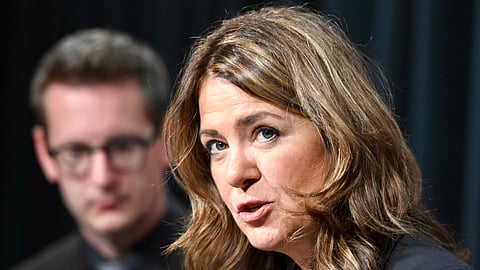

Alberta Premier Danielle Smith in 2025
Courtesy Government of Alberta
Speaking in a Fort McMurray town hall, Alberta Premier Danielle Smith delivered a political right hook to the jaw of Canada’s Liberal establishment — to the delight of many attendees in August.
Responding to a question, she said: “What we're talking about tonight is Ottawa over-taxing us. I mentioned that at the beginning of the evening that our program costs are 70% of all tax dollars, we only collect 40%.
Ottawa collects 60% and then they use political means to transfer it. Alberta, year after year, has $20 billion to $25 billion that is siphoned out of our system to go to Ottawa so that it can be spent mostly in Quebec, but also in other places that vote Liberal.”
“We have been watching this for years — $600 billion in the last 40 or 50 years that have been taken out of this province. You don't think we might be able to do a little bit more on social spending if those 20 to $25 billion stayed here?"
"You don't think we'd be able to cut taxes a bit if those 20 to $25 billion stayed here? It is $5,000 per Albertan that every single year gets transferred out of this province for political reasons so that the Liberals can continue to spend it in places that vote Liberal.”
Despite recent PR wins, Smith faces big problems heading into the fall session of the Alberta Legislature.
The United Conservative Party (UCP) are grappling with significant controversies, primarily the so called "CorruptCare" scandal and an expense disclosure issue. There's also confusion about Alberta's separatist movement and where Smith stands.
The CorruptCare scandal erupted after former Alberta Health Services (AHS) CEO Athana Mentzelopoulos, fired in January 2025, alleged she was dismissed for probing costly private surgical contracts allegedly favoured by UCP insiders. She claimed Smith’s office pressured her to approve inflated deals.
The Alberta NDP, led by Naheed Nenshi, have demanded a public inquiry and accused Smith of orchestrating a coverup.
Smith denied the allegations and ordered an auditor general review, though its independence is questioned. The RCMP are also investigating.
Also, Smith faced backlash for the removal a requirement for UCP ministers and staff to disclose expense receipts over $100, citing security concerns. Public outcry forced her to pledge a reversal, but the move fuelled transparency concerns, especially amid allegations of UCP staff receiving perks like NHL tickets linked to alleged shady deals.
Scandal, real or imagined, triggered former infrastructure minister Peter Guthrie’s resignation and expulsion from the UCP after supporting an NDP inquiry motion, exposing party rifts.
Former UCP MLA Scott Sinclair also began sitting as an independent after calling out the UCP’s budget.
Guthrie and Sinclair initially planned to revive the Progressive Conservative Party of Alberta. They have since joined the Alberta Party, aiming to rebrand it as the Progressive Conservatives to offer a centrist conservative alternative, leveraging the existing party's infrastructure to gain official recognition faster.
As for Smith, if she manages to ward off attacks this fall, she'll emerge as Canada's Iron Lady of politics — a Thatcher-esque character capable of supplanting Pierre Poilievre and leading a Canada-wide conservative revival — if she chooses.
Smith and Margaret Thatcher, the former Prime Minister of the UK, share similarities in their political approaches and ideologies. Both are staunch advocates for free-market policies, emphasizing limited government intervention, deregulation, and economic liberalization to foster growth and individual responsibility.
Smith’s push for Alberta’s economic autonomy, through policies like reducing bureaucratic red tape and promoting the energy sector, echoes Thatcher’s transformative reforms in privatizing state-owned industries and curbing union influence in the 1980s.
Their shared commitment to fiscal conservatism—at least on paper—and skepticism of centralized authority—Smith with her resistance to federal overreach in Canada and Thatcher with her defiance of European integration—highlights a parallel focus on regional sovereignty and economic self-reliance, often polarizing public opinion but galvanizing their conservative bases.